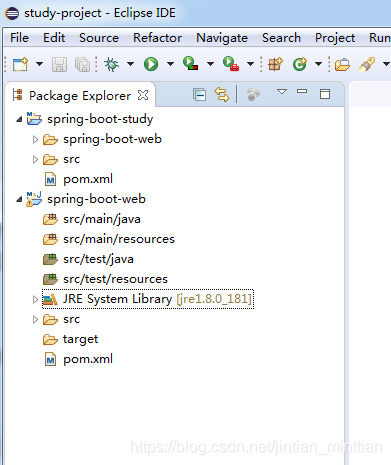标签:pom plugin 管理 .class 网上 shadow ref ati ping
springboot的目的是为了简化spring应用的开发搭建以及开发过程。内部使用了特殊的处理,使得开发人员不需要进行额外繁锁的xml文件配置的编写,其内部包含很多模块的配置只需要添加maven依赖即可使用,这项功能可谓对开发人员提供了大大的好处。使用springboot只需要简单配置一下就可以完成之前复杂的配置过程。可以到https://start.spring.io/此网站上,下载一个最简单的springboot应用,然后一步一步实现自已的应用。
可以看出当前的稳定版本为2.1.0,点击Generate Project 按钮,即可下载一个可用的springboot应用。

这个是我下载下来后,双击后出来的。可以看出以工程是一个基于maven的项目。你可以将其解压到任何一个目录下,通过eclipse或其他IDE进行导入后运行,eclipse导入流程为File->import->maven->existing maven projects,查找到自己的项目目录。也可以基于此工程来建立自已的maven项目。
下面以建立自己的maven项目
在建立项目时,可以创建一个多模块聚合项目,即在创建项目时选中 选择为pom。
选择为pom。
创建后的工程结构为


<parent>
<groupId>org.springframework.boot</groupId>
<artifactId>spring-boot-starter-parent</artifactId>
<version>2.1.0.RELEASE</version>
<relativePath/> <!-- lookup parent from repository -->
</parent>
<properties>
<project.build.sourceEncoding>UTF-8</project.build.sourceEncoding>
<project.reporting.outputEncoding>UTF-8</project.reporting.outputEncoding>
<java.version>1.8</java.version>
</properties>将此段代码复制到 spring-boot-study工程中的pom文件中
将下面的依赖复制到spring-boot-web工程中的pom文件中
<dependencies>
<dependency>
<groupId>org.springframework.boot</groupId>
<artifactId>spring-boot-starter</artifactId>
</dependency>
<dependency>
<groupId>org.springframework.boot</groupId>
<artifactId>spring-boot-starter-test</artifactId>
<scope>test</scope>
</dependency>
</dependencies>
<build>
<plugins>
<plugin>
<groupId>org.springframework.boot</groupId>
<artifactId>spring-boot-maven-plugin</artifactId>
</plugin>
</plugins>
</build>eclipse自动完成项目工程的配置。完成后项目中所有需要依赖的jar包自动配置完成。
@SpringBootApplication
@RestController
public class WebApplication {
@RequestMapping("/hello")
public String helloWorld() {
return "Hello World";
}
public static void main(String[] args) {
SpringApplication.run(WebApplication.class, args);
}
}
HelloWold就已经完成后。可以在浏览器中输入localhost:8080/hello即可看到效果

springboot默认启动后的端口为8080,但可以在application.properties文件中进行修改。
server.port=9001将端口修改为9001,重新启动项目后,在浏览器中输入入localhost:9001/hello同样可以看到相同的结果。
<!-- 加入thymeleaf的支持 -->
<dependency>
<groupId>org.springframework.boot</groupId>
<artifactId>spring-boot-starter-thymeleaf</artifactId>
</dependency>但在Spring Boot项目中,一般src/main/resources/static目录用于存放各类静态资源文件,例如css、js和image等。src/main/resources/templates用于存放页面文件,例如html,jsp等。所以在spring-boot-web中的resources目录下创建static目录与templates目录,并将相应的资源文件放置在各自的目录下。
配置thymeleaf
#thymeleaf
spring.thymeleaf.prefix=classpath:/templates/
spring.thymeleaf.suffix=.html
spring.thymeleaf.mode=HTML
spring.thymeleaf.encoding=UTF-8
spring.thymeleaf.servlet.content-type=text/html
spring.thymeleaf.cache=falsehtml文件修改,增加xmlns:th="http://www.thymeleaf.org" 属性,资源文件的引入要修改。
<link href="../static/css/style.css" th:href="@{/css/style.css}" rel="stylesheet" />
<link href="../static/css/login.css" th:href="@{/css/login.css}" rel="stylesheet" />然后编写 java代码
@Controller
public class IndexController {
@RequestMapping("/")
public String index() {
return "login";
}
}
重新启动程序,访问localhost:9001/就可成功跳转至login.html登陆界面上。
注:thymeleaf对html标签要求很严格,每一个标签都需要成对出现。
调试过程中遇到下面异常信息
org.thymeleaf.exceptions.TemplateInputException: Error resolving template [login], template might not exist or might not be accessible by any of the configured Template Resolvers
at org.thymeleaf.engine.TemplateManager.resolveTemplate(TemplateManager.java:869) ~[thymeleaf-3.0.11.RELEASE.jar:3.0.11.RELEASE]
at org.thymeleaf.engine.TemplateManager.parseAndProcess(TemplateManager.java:607) ~[thymeleaf-3.0.11.RELEASE.jar:3.0.11.RELEASE]
at org.thymeleaf.TemplateEngine.process(TemplateEngine.java:1098) [thymeleaf-3.0.11.RELEASE.jar:3.0.11.RELEASE]
at org.thymeleaf.TemplateEngine.process(TemplateEngine.java:1072) [thymeleaf-3.0.11.RELEASE.jar:3.0.11.RELEASE]
at org.thymeleaf.spring5.view.ThymeleafView.renderFragment(ThymeleafView.java:362) [thymeleaf-spring5-。。。。。。。。。。。因为错将templates写成templatse导致。
至此实现从后端服务访问到登陆界面的搭建,还没有具体登陆逻辑实现。
下一篇实现登陆业务逻辑。
附上 本篇文章源代码
一步一步实现web程序信息管理系统之二----后台框架实现跳转登陆页面
一步一步实现web程序信息管理系统之二----后台框架实现跳转登陆页面
标签:pom plugin 管理 .class 网上 shadow ref ati ping
原文地址:https://www.cnblogs.com/oops-374565452/p/9928619.html